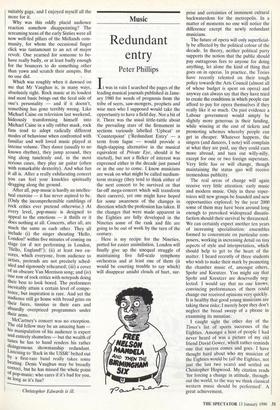Musi c
Redundant entry
Peter Phillips
t was in vain I searched the pages of the leading musical journals published in Janu- ary 1980 for words of prognosis from the tribe of seers, saw-mongers, prophets and wise men who I supposed would take the opportunity to have a field day. Not a bit of it. There was the usual tittle-tattle about the prevailing stars of the firmament in sections variously labelled 'Upbeat' or `Counterpoint' ('Redundant Entry' — a term from fugue — would provide a thigh-slapping alternative in the musical equivalent of Private Eye, should it be started), but not a flicker of interest was expressed either in the decade just passed or in the one to come. I know musicians are weak on what might be called medium- term strategy (they tend to think either of the next concert to be survived or that far-off mega-concert which will transform their careers), yet one might have hoped for some awareness of the changes in direction which the profession has taken. If the changes that were made apparent in the Eighties are fully developed in the Nineties some of the rank and file are going to be out of work by the turn of the century.
_ Here is my recipe for the Nineties, potted for easier assimilation. London will finally give up the unequal struggle of maintaining five full-scale symphony orchestras and at least one of them (it would be courting trouble to say which) will disappear amidst clouds of hurt, sur- prise and certainties of imminent cultural backwaterdom for the metropolis. In a matter of moments no one will notice the difference except the newly redundant musicians.
The future of opera will only superficial- ly be affected by the political colour of the decade. In theory, neither political party supports the notion that the public should pay outrageous fees to anyone for doing anything, let alone the kind of thing that goes on in operas. In practice, the Tories have recently relented on their tough policy towards the Arts Council (almost all of whose budget is spent on opera) and anyway can always say that they have tried to create the conditions in which people can afford to pay for opera themselves if they really like it so much. On past evidence a Labour government would simply be slightly more generous in their funding, while wincing at the cost of tickets and promoting schemes whereby people can get in cheaper. Whatever happens, the singers (and dancers, I note) will complain at what they are paid, say they could earn more abroad, and turn out willy-nilly, except for one or two foreign superstars. Very little has or will change, though maintaining the status quo will receive tremendous publicity.
The real areas of change will again receive very little attention: early music and modern music. Only in these reper- toires will new groups be founded and new opportunities explored; by the year 2000 some of them may have been around long enough to provoked widespread dissatis- faction should their survival be threatened. We can certainly expect another ten years of increasing specialisation: ensembles formed to concentrate on particular com- posers, working in increasing detail on tiny aspects of style and interpretation, which should help to get to the heart of the matter. I heard recently of three students who wish to make their mark by promoting the chamber music of, amongst others, Spohr and Kreutzer. You might say that Spohr and Kreutzer are deservedly neg- lected. I would say that no one knows; convincing performances of them could change our received opinions very quickly. It is healthy that good young musicians are taking these risks; I merely hope they don't neglect the broad sweep of a phrase in examining its minutiae. I caught sight the other day of the Times's list of sports successes of the Eighties. Amongst a host of people I had never heard of was a picture of my old friend David Gower, which rather reminds one that success comes and goes. I have thought hard about who my musician of the Eighties would be (all the Eighties, not just the last two years) and settled on Christopher Hogwood. My citation reads 'for forcing a change in attitude, through- out the world, to the way we think classical western music should be performed'. A great achievement.










































 Previous page
Previous page